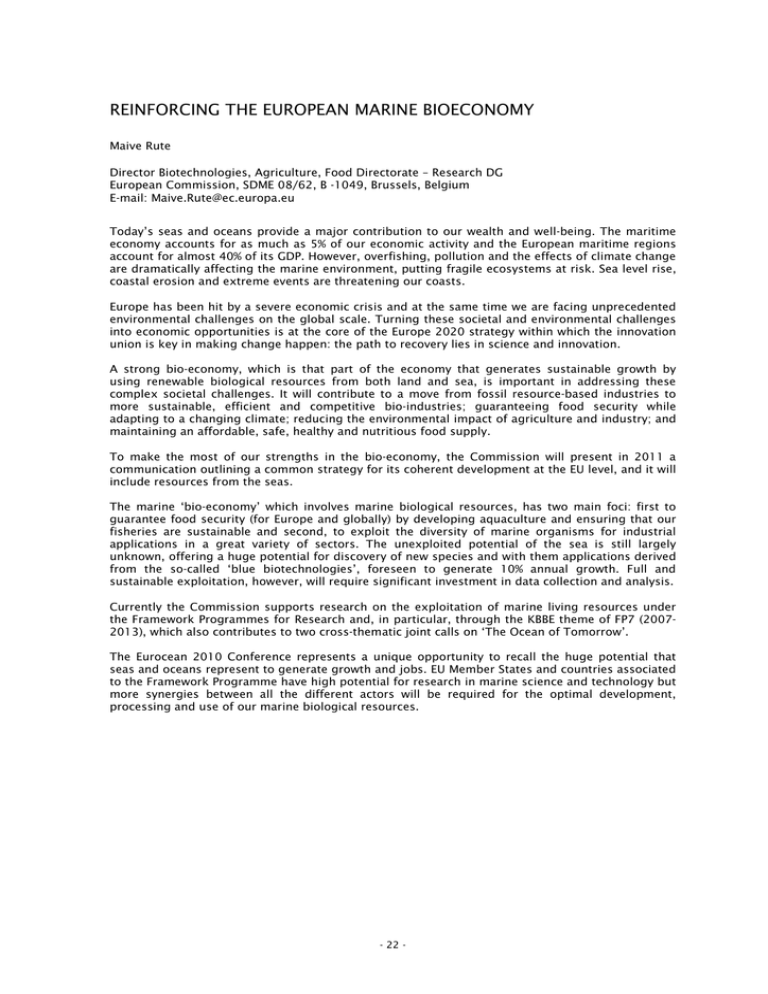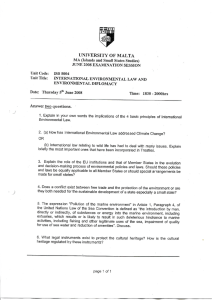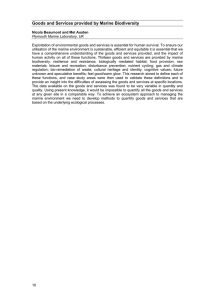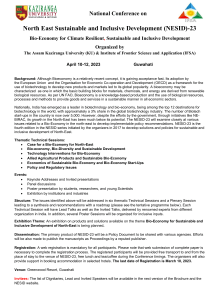REINFORCING THE EUROPEAN MARINE BIOECONOMY
advertisement

REINFORCING THE EUROPEAN MARINE BIOECONOMY Maive Rute Director Biotechnologies, Agriculture, Food Directorate – Research DG European Commission, SDME 08/62, B -1049, Brussels, Belgium E-mail: Maive.Rute@ec.europa.eu Today’s seas and oceans provide a major contribution to our wealth and well-being. The maritime economy accounts for as much as 5% of our economic activity and the European maritime regions account for almost 40% of its GDP. However, overfishing, pollution and the effects of climate change are dramatically affecting the marine environment, putting fragile ecosystems at risk. Sea level rise, coastal erosion and extreme events are threatening our coasts. Europe has been hit by a severe economic crisis and at the same time we are facing unprecedented environmental challenges on the global scale. Turning these societal and environmental challenges into economic opportunities is at the core of the Europe 2020 strategy within which the innovation union is key in making change happen: the path to recovery lies in science and innovation. A strong bio-economy, which is that part of the economy that generates sustainable growth by using renewable biological resources from both land and sea, is important in addressing these complex societal challenges. It will contribute to a move from fossil resource-based industries to more sustainable, efficient and competitive bio-industries; guaranteeing food security while adapting to a changing climate; reducing the environmental impact of agriculture and industry; and maintaining an affordable, safe, healthy and nutritious food supply. To make the most of our strengths in the bio-economy, the Commission will present in 2011 a communication outlining a common strategy for its coherent development at the EU level, and it will include resources from the seas. The marine ‘bio-economy’ which involves marine biological resources, has two main foci: first to guarantee food security (for Europe and globally) by developing aquaculture and ensuring that our fisheries are sustainable and second, to exploit the diversity of marine organisms for industrial applications in a great variety of sectors. The unexploited potential of the sea is still largely unknown, offering a huge potential for discovery of new species and with them applications derived from the so-called ‘blue biotechnologies’, foreseen to generate 10% annual growth. Full and sustainable exploitation, however, will require significant investment in data collection and analysis. Currently the Commission supports research on the exploitation of marine living resources under the Framework Programmes for Research and, in particular, through the KBBE theme of FP7 (20072013), which also contributes to two cross-thematic joint calls on ‘The Ocean of Tomorrow’. The Eurocean 2010 Conference represents a unique opportunity to recall the huge potential that seas and oceans represent to generate growth and jobs. EU Member States and countries associated to the Framework Programme have high potential for research in marine science and technology but more synergies between all the different actors will be required for the optimal development, processing and use of our marine biological resources. - 22 -






